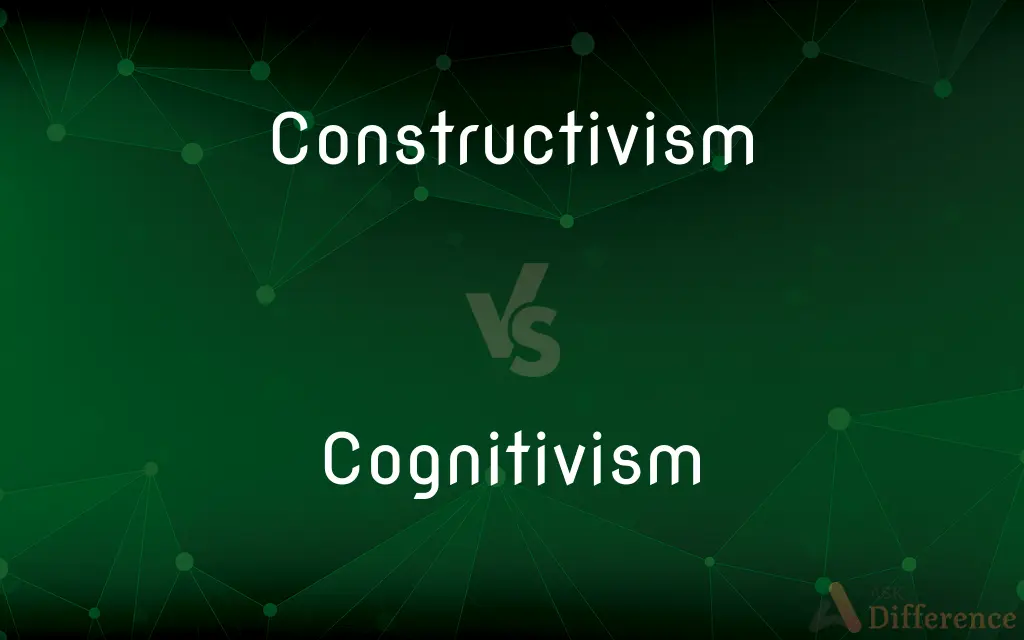Constructivism vs. Cognitivism — What's the Difference?
By Tayyaba Rehman — Published on January 14, 2024
Constructivism focuses on how learners actively construct their own understanding, while cognitivism centers on how the mind processes and stores information.

Difference Between Constructivism and Cognitivism
Table of Contents
ADVERTISEMENT
Key Differences
Constructivism emphasizes that learning is an active, constructive process where learners build new ideas based on their current/past knowledge. Cognitivism, on the other hand, studies how information is received, processed, stored, and recalled by the mind.
In constructivism, learning is seen as a subjective process shaped by individual experiences and interpretations. Cognitivism views learning as a function of the brain, focusing on cognitive processes like memory, perception, and problem-solving.
Constructivist theory advocates for learner-centered education, with a focus on exploration and discovery. Cognitivism supports structured, teacher-directed learning, guided by clear objectives and reinforcements.
Constructivism emphasizes the importance of context and social interaction in learning. Cognitivism concentrates on the individual's mental processes and the role of internal mental behavior.
In constructivism, assessment is often formative, reflecting the ongoing nature of learning. In cognitivism, assessments are typically summative, measuring the retention and understanding of information.
ADVERTISEMENT
Comparison Chart
Learning Theory
Learners construct knowledge based on experiences
Focus on internal mental processes
Learning Process
Subjective, exploratory, learner-centered
Structured, information processing, teacher-directed
Focus
Individual experiences and context
Memory, perception, problem-solving
Education Approach
Discovery learning, social interaction
Structured instruction, clear objectives
Assessment Type
Formative, reflective of ongoing learning
Summative, measuring information retention
Compare with Definitions
Constructivism
Emphasizes learner-centered education.
Constructivism in classrooms translates to more group discussions and interactive projects.
Cognitivism
Focuses on the mental processes of learning.
Cognitivism studies how students memorize and recall historical dates.
Constructivism
Knowledge gained through experience and reflection.
In constructivism, a history lesson involves analyzing past events to understand current affairs.
Cognitivism
Learning viewed as brain-based information processing.
Cognitivism would analyze how a learner decodes and comprehends a complex text.
Constructivism
Learning as constructing personal understanding.
Constructivism encourages students to derive their own theories about scientific phenomena.
Cognitivism
Concentrates on how information is stored in the brain.
Cognitivism explores the use of mnemonic devices to improve memory retention.
Constructivism
Focuses on the role of context in learning.
Constructivism integrates cultural and social contexts into language learning.
Cognitivism
Emphasizes structured, objective-driven teaching.
Cognitivist strategies involve using repetition and reinforcement in teaching vocabulary.
Constructivism
Supports discovery and exploration in education.
A constructivist math class involves students discovering formulas through problem-solving.
Cognitivism
Involves understanding cognitive development stages.
Cognitivism applies Piaget's stages of cognitive development to tailor educational content.
Constructivism
A movement in modern art originating in Moscow in 1920 and characterized by the use of industrial materials such as glass, sheet metal, and plastic to create nonrepresentational, often geometric objects.
Cognitivism
(philosophy) The view that ethical sentences express propositions and are therefore capable of being true or false.
Constructivism
(arts) A Russian movement in modern art characterized by the creation of nonrepresentational geometric objects using industrial materials.
Cognitivism
(arts) The view that a work of art is valuable if it contributes to knowledge.
Constructivism
(mathematics) A philosophy that asserts the need to construct a mathematical object to prove it exists.
Cognitivism
(psychology) The view that mental function can be understood as the internal manipulation of symbols according to a set of rules.
Constructivism
A psychological epistemology which argues that humans generate knowledge and meaning from their experiences.
Constructivism
An abstractionist artistic movement in Russia after World War I; industrial materials were used to construct nonrepresentational objects
Common Curiosities
Can constructivism involve group learning?
Yes, it often includes social interaction and collaborative learning.
What is the main principle of constructivism?
Learners construct knowledge through experiences and reflection.
How does cognitivism view learning?
As a process of mental information processing and storage.
How does cognitivism view the role of a teacher?
As a guide who structures learning and directs cognitive processes.
What is a key teaching method in constructivism?
Facilitating exploratory and discovery-based learning experiences.
Does cognitivism use memory techniques?
Yes, it often involves strategies for memory improvement and recall.
What type of assessment is common in constructivism?
Formative assessments that reflect ongoing learning processes.
Can constructivism be applied in online learning?
Yes, through interactive and exploratory digital learning environments.
Is constructivism student-centered?
Yes, it places the learner at the center of the learning process.
How does cognitivism influence teaching strategies?
By focusing on structured, objective-driven, and brain-based methods.
How does cognitivism address different learning styles?
By understanding and applying different cognitive processes.
Does constructivism focus on individual experiences?
Yes, it considers individual contexts and experiences crucial.
What role does feedback play in cognitivism?
It's crucial for reinforcing learning and guiding cognitive processes.
Does constructivism encourage self-directed learning?
Yes, it supports learners in taking an active role in their education.
Are cognitivist classrooms more structured?
Yes, they often have clear objectives and structured activities.
Share Your Discovery

Previous Comparison
AutoCAD vs. FreeCAD
Next Comparison
Atomic Weight vs. Atomic MassAuthor Spotlight
Written by
Tayyaba RehmanTayyaba Rehman is a distinguished writer, currently serving as a primary contributor to askdifference.com. As a researcher in semantics and etymology, Tayyaba's passion for the complexity of languages and their distinctions has found a perfect home on the platform. Tayyaba delves into the intricacies of language, distinguishing between commonly confused words and phrases, thereby providing clarity for readers worldwide.













































